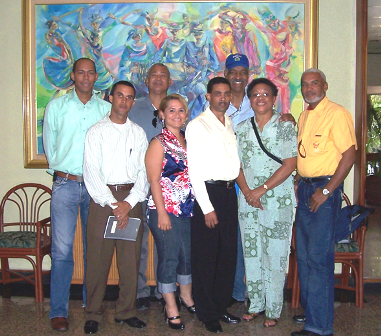|
|
| Study Abroad History The Founder of the International Nursing Education Consortium is no stranger to study abroad for nurses. Dr. Fennal made history by internationalizing the nursing curriculum at South Carolina State University, and taking undergraduate nursing students abroad. The event made South Carolina State one of only six schools of nursing in the United States that had internationalized the curriculum at that time, and the first Historically Black College/University school of nursing. Five nursing students and Dr. Fennal completed a five week clinical practicum in Santo Domingo Dominican Republic. The practicum included hands on care in two hospitals, study of Spanish language and culture at the Universidad Pedro Henriquez Urena (UMPHU) as well as culture tours. Culture immersion included living in the homes of Spanish families and participating as one of the members of the family. The project was extremely successful. The precursor to the International Nursing Education Consortium was completed with the assistance from the International Education Resource Center in Santo Domingo Dominican Republic. | | 
Members of the Fundacion Sociedad en Desarrollo Provincia Santo Domingo, Inc. team and team members of the International Nursing Education Consortium, including Dr. Raymond Giles, third from left, Consultant to the International Nursing Education Consortium. | |
| STUDY ABROAD AS A NEW STRATEGY FOR DEVELOPING NURSING CULTURAL COMPETENCY AND SENSITIVITY The programs of the INEC will assist in the building of a foundation for improvement in cultural diversity, cultural competence and cultural sensitivity. The programs are designed for all nurses and student nurses, but there is particular interested in providing opportunity for nurses and student nurses of color to study abroad. Although study abroad numbers have increased (Institute of International Education, 2007), Nursing continues to be one of the underrepresented groups for study abroad. African American students are 3.5% of students studying abroad, while Caucasians are 83%. The onset of a global society has increased the multicultural groups in this and other countries. Therefore it is necessary for all health care workers, especially nurses to be educated in multiculturalism. In certain parts of the country there are multiple pockets of different groups from all over the world. Individuals with like values tend to congregate in close proximity. In some states like California, New York and Texas one may be able to actually achieve cultural immersion. However in other parts of the country there may be no opportunity to practice with different groups. In such a case a study abroad program for nurses would accomplish a culturally diverse experience. The other part of this equation is the fact that clinical facilities are becoming scarce in certain parts of the United States. This may be due to the demand to produce more professional nurses. Prospective students interested in Nursing are turned away for nursing programs due to lack of faculty, the number of students which can be accommodated and available clinical space. Study abroad could serve two purposes a teaching /learning experience in cultural exchange and provision of a clinical experience where one can practice in a realistic setting, rather than a lab or in front of a computer. Dr.Giger agrees that if clinical space is not available in your area or if there is only one or two culture groups, “a study abroad experience would be in order” (Giger 2008). | |
|